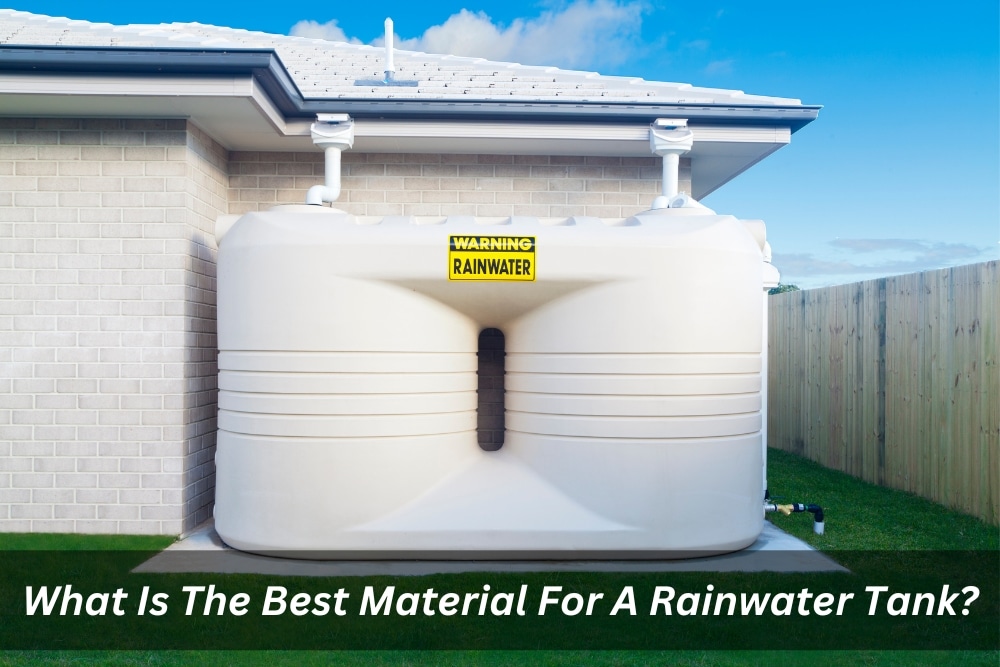When it comes to installing a water tank for efficient water management, selecting the right rainwater tank materials is of utmost importance. The choice of materials plays a vital role in determining the tank’s durability, reliability, and overall performance. Galvanised steel, stainless steel, and plastic tanks are some of the popular options available in the market today.
In this blog post, we will delve into the pros and cons of each material, considering factors such as water supply needs, installation requirements, water bills, and tank manufacturers’ recommendations. Whether you’re aiming to collect a few hundred or thousands of litres of water, finding the best material, combined with essential features like a reliable ball valve, ensures your rainwater tank meets your expectations while benefiting both the environment and your wallet.
What’s the significance of selecting the appropriate material?
Choosing the right rainwater tank material is crucial as it can impact the durability, efficiency, and overall quality of the tank. The appropriate material can ensure that the tank lasts longer, is resistant to damage, and provides safe and clean water. Here are some reasons why selecting the right rainwater tank material is significant:
- Durability: A high-quality rainwater tank material is essential to ensure the longevity of the tank. The material should be resistant to extreme weather conditions, such as extreme temperatures and heavy winds, and should not corrode or degrade over time.
- Efficiency: The right material can also impact the efficiency of the rainwater harvesting system. The material should be able to efficiently collect and store rainwater, ensuring that it is kept clean and free from contaminants.
- Safety: The material used in the rainwater tank should be safe for storing water that is fit for consumption. If the material is not safe, it can lead to contamination of the water, which can result in various health problems.
- Cost-effective: Selecting the appropriate material can also result in a cost-effective solution in the long run. High-quality materials that are durable and efficient can save money in terms of repairs and maintenance over the life of the rainwater harvesting system.
- Environmental impact: Choosing the right material can also have a positive impact on the environment. Materials that are eco-friendly, such as recycled plastic or stainless steel, can reduce the carbon footprint of the rainwater harvesting system.
In summary, selecting the appropriate rainwater tank material is significant for ensuring the durability, efficiency, safety, cost-effectiveness, and environmental impact of the system. It is important to consider the material’s properties and characteristics before making a decision to ensure that the system functions optimally.
What are the different types of materials used for rainwater tanks?
- Steel Rainwater Tanks
Most people use steel water tanks, which are available in various sizes to fit into most spaces. The stainless steel tank is an excellent choice as it is strong and durable. Making it resistant to rust, corrosion, and other forms of damage. Steel also requires minimal maintenance which can be very cost-effective in the long run. The one downside to steel tanks is that they require a galvanised steel coating to prevent algae growth.
- Poly Water Tank
Polyethylene, a special kind of plastic, makes Polywater tanks lightweight and durable. The material helps make these tanks more flexible and less prone to cracking or splitting, and the tanks are also resistant to algae growth. These tanks require minimal maintenance and are very cost-effective, making them a popular choice. The only downside to poly water tanks is that they may not be able to hold as much water as other materials.
- Concrete Tanks
Concrete tanks are an ideal choice for storing large amounts of water and they’re resistant to most forms of damage. You can design concrete tanks in any shape or size to suit your needs and requirements. Nonetheless, maintaining them requires a significant amount of effort since you must seal them properly to prevent leaks. Additionally, these tanks can be expensive due to their labour-intensive installation process which requires a licenced plumber.
- Fibreglass Tanks
Fibreglass tanks are a popular choice for rainwater harvesting as they are lightweight, durable, and corrosion-resistant. They also require minimal maintenance and are very cost-effective in comparison to other materials. One can customise fibreglass tanks to fit any space and choose from a variety of features such as UV protection or built-in ball valves. The only downside to these tanks is that they may not be able to hold as much water as other materials.
When it comes to choosing the best material for a rainwater tank, there is no one-size-fits-all option as each material has its own unique advantages and disadvantages. The best option for you will depend on your individual needs and budget. Steel tanks are ideal for those looking for a durable and maintenance-free water tank. While poly tanks offer the most cost-effective solution. Concrete tanks can hold large amounts of water but require significant maintenance and installation costs. While fibreglass tanks offer durability at a higher price point. Ultimately, it’s important to do your research and find the best material for your rainwater tank.
What factors should you consider when choosing the best rainwater tank materials?
When it comes to selecting the best rainwater tank material, there are a few important factors to consider.
- Firstly, you should think about the size of the tank and how much water you need to store. Steel tanks come in a range of sizes so you’ll be able to find one that fits your space requirements. Poly tanks may not hold as much water. So, if you need more storage capacity then steel may be the better option.
- Secondly, take into account the cost of rainwater tank installation and maintenance. Steel tanks are usually the most affordable option upfront but require regular maintenance to keep them functioning properly. In the long run, poly tanks can be more cost-effective because they require minimal upkeep.
- Thirdly, factor in the durability of the material. Steel and concrete tanks are both very strong and long-lasting, while fibreglass and polyethylene tanks may not be as resilient.
- Finally, consider how prone the material is to algae growth. To prevent algae, galvanising is necessary for steel, while poly and fibreglass possess natural resistance.
Conclusion
To summarize, when it comes to choosing the ideal material for a rainwater tank, there is no single solution that fits all homeowners. It is crucial to take into account the benefits of having a rainwater tank in your home. Including saving money on water bills and reducing your carbon footprint. Additionally, consider your specific requirements and financial resources. As well as the tank’s size, installation and maintenance costs, longevity, and susceptibility to algae growth. With thorough investigation and careful consideration, you will be able to select the most appropriate material for your rainwater tank and enjoy the many advantages it provides.
Looking for the best material for your rainwater tank? Look no further than Apex Plumbing Solutions! Our expert team can guide you through the selection process and help you choose the perfect material for your needs. Contact us today to schedule a consultation and get started on your rainwater tank setup. Trust us to provide quality solutions for all your plumbing needs!


